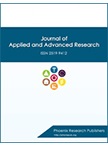Antimicrobial activity evaluation of frankincense oil in domestic water samples by 16s rRNA gene
DOI:
https://doi.org/10.21839/jaar.2017.v2i4.104Abstract
The domestic water system permits the growth and reproduction of bacterial species. The removal of such contaminants by the application of chemical disinfectants like chlorine may pose health risk. Therefore, the natural products are more favored to be investigated for its antimicrobial activity. The current study investigates the efficiency of frankincense oil as an antimicrobial agent on bacterial species isolated from the domestic water system. In the previous study, 15 bacterial species were isolated based on the colony morphological characteristics and prepared for identification. 16S rDNA gene was amplified using PCR for all bacterial isolates followed by sequencing and identification using BLAST. Thirteen bacterial isolates were identified and represented in Staphylococcus saprophhyticus, Bacillus pumilus, Bacillus safensis and Pseudomonas sp. and the last one showed more resistant to frankincense oil as the numbers increased with the treatment by 26% and 35%. Other species were either completely or partially eliminated. The results confirmed that the antimicrobial activity of frankincense oil against some bacterial species, mainly exist in storage tank. Pseudomonas sp. showed resistance to frankincense oil (10%) used in this study. In addition, Staphylococcus saprophhyticus is of a concern to human health, however, it showed sensitivity to frankincense oil and also, its presence in the water tank indicates hygiene issues of the household. The frankincense oil found to be a promising disinfectant, thus further analysis needed to specify the minimum effective concentration to be applied, also to find out whether it is cost effective to be used as a disinfectant.Downloads
Download data is not yet available.
Published
24-08-2017
Issue
Section
Research Article





 .
.